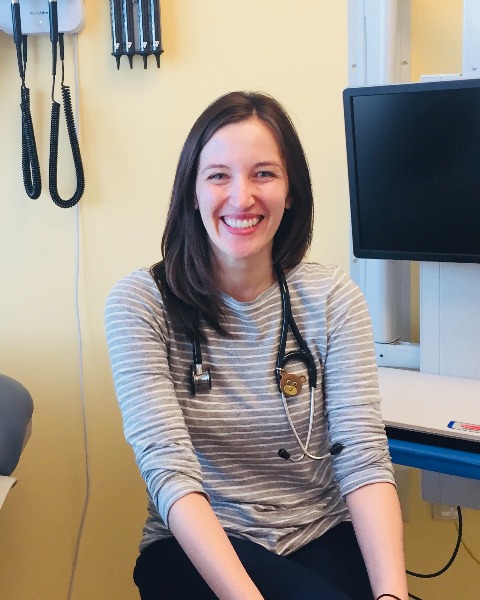Mental Health
Category: Abstract Submission
Mental Health II
544 - Strengthening Family Support for LGBTQ2S+ youth: A pilot study of a parent education video
Monday, April 25, 2022
3:30 PM - 6:00 PM US MT
Poster Number: 544
Publication Number: 544.423
Publication Number: 544.423
Alessandra Angelino, University of North Carolina at Chapel Hill School of Medicine, chapel Hill, NC, United States; Martha F. Perry, UNC School of Medicine, Chapel Hill, NC, United States; Mary Catherine Penn, University of North Carolina at Chapel Hill School of Medicine, Chapel Hill, NC, United States; Lang Li, University of North Carolina at Chapel Hill School of Medicine, Chapel Hill, NC, United States; Emily B. Vander Schaaf, University of North Carolina at Chapel Hill School of Medicine, Carrboro, NC, United States

Emily B. Vander Schaaf, MD, MPH, FAAP (she/her/hers)
Associate Professor
University of North Carolina at Chapel Hill School of Medicine
Carrboro, North Carolina, United States
Presenting Author(s)
Background: Lesbian, gay, bisexual, transgender, queer, two-spirit, and other sexual and gender minority youth (LGBTQ2S+) are at increased risk for mental illness. Family support is a vital protective factor, but few evidence-based interventions seek to promote it.
Objective: Assess a novel video and survey tool, and collect pilot data on the video’s effects on parent knowledge and attitudes regarding support for LGBTQ2S+ youth
Design/Methods: Participants were English-speaking caregivers of children from a pediatric primary care clinic or recruited via a university research site. Caregivers completed a baseline survey developed from an existing anti-LGBTQ2S+ bias score tool, along with several knowledge questions. After watching the 7-minute video they answered additional knowledge questions. Cognitive interviewing assessed participants’ views of the video and survey tool. Participants were sent an optional follow-up survey 1+ month later that consisted of a repeat bias scale, knowledge questions, and comment box. Two reviewers analyzed cognitive interview notes using inductive and deductive coding in the Atlas.ti software system. Survey data was analyzed with paired t-test.
Results: 29 participants completed the baseline survey, of which 27 did the post-video survey, 27 an interview, and 15 the 1+ month survey. 43% had an LGBTQ2S+ loved one. Overall, participants supported the video regardless of baseline anti-LGBTQ2S+ bias. All stated the video taught them something, led to self-reflection, or would change family interactions. They stated the video provided language for family discussion, emphasized the importance of family support, increased awareness of mental health implications, and changed their perspectives. Many expressed interest in sharing the video. Critiques included wanting more stories and believing scenarios were unrealistic. Most stated survey questions were easy to understand, but that knowledge questions were unrealistic and leading. Individuals with higher baseline anti-LGBTQ2S+ bias more frequently shared experiences about generational differences and upbringings. Individuals with lower baseline bias more commonly mentioned barriers to support. There was a trend toward improvement in anti-LGBTQ2S+ bias scores at 1 month follow-up, (n=15, p=0.06), indicating a need for future larger, more rigorous study.Conclusion(s): Pilot qualitative data suggests a brief video may effectively improve caregivers’ understanding of evidence-based methods to support LGBTQ2S+ youth. Future studies will modify the survey and evaluate the video’s effects in a more rigorous manner.
Objective: Assess a novel video and survey tool, and collect pilot data on the video’s effects on parent knowledge and attitudes regarding support for LGBTQ2S+ youth
Design/Methods: Participants were English-speaking caregivers of children from a pediatric primary care clinic or recruited via a university research site. Caregivers completed a baseline survey developed from an existing anti-LGBTQ2S+ bias score tool, along with several knowledge questions. After watching the 7-minute video they answered additional knowledge questions. Cognitive interviewing assessed participants’ views of the video and survey tool. Participants were sent an optional follow-up survey 1+ month later that consisted of a repeat bias scale, knowledge questions, and comment box. Two reviewers analyzed cognitive interview notes using inductive and deductive coding in the Atlas.ti software system. Survey data was analyzed with paired t-test.
Results: 29 participants completed the baseline survey, of which 27 did the post-video survey, 27 an interview, and 15 the 1+ month survey. 43% had an LGBTQ2S+ loved one. Overall, participants supported the video regardless of baseline anti-LGBTQ2S+ bias. All stated the video taught them something, led to self-reflection, or would change family interactions. They stated the video provided language for family discussion, emphasized the importance of family support, increased awareness of mental health implications, and changed their perspectives. Many expressed interest in sharing the video. Critiques included wanting more stories and believing scenarios were unrealistic. Most stated survey questions were easy to understand, but that knowledge questions were unrealistic and leading. Individuals with higher baseline anti-LGBTQ2S+ bias more frequently shared experiences about generational differences and upbringings. Individuals with lower baseline bias more commonly mentioned barriers to support. There was a trend toward improvement in anti-LGBTQ2S+ bias scores at 1 month follow-up, (n=15, p=0.06), indicating a need for future larger, more rigorous study.Conclusion(s): Pilot qualitative data suggests a brief video may effectively improve caregivers’ understanding of evidence-based methods to support LGBTQ2S+ youth. Future studies will modify the survey and evaluate the video’s effects in a more rigorous manner.
